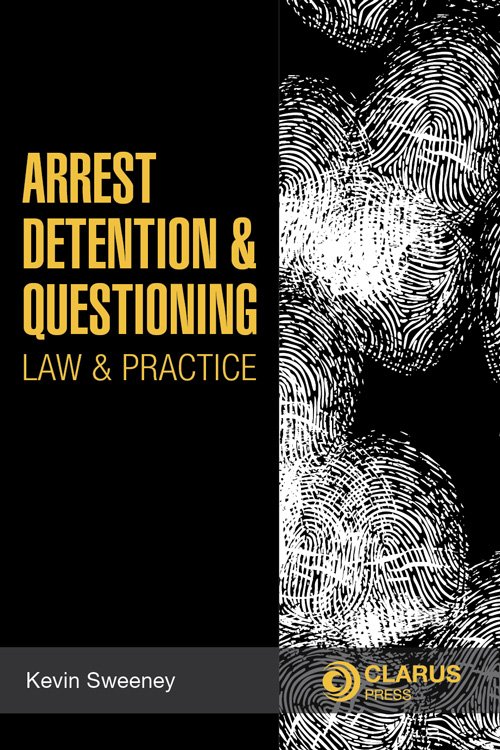About the Book
Arrest, Detention and Questioning: Law and Practice examines the law and practice of some of the key functions of policing in Ireland in relation to Garda investigations and a person’s rights in custody.
The investigation of crime is a core function of An Garda Síochana. As a result, the arrest, detention and questioning of criminal suspects is a routine process in Garda investigations. The legal architecture that permits such questioning is a combination of relatively new legislation and regulations overlaid on other rules and procedures that are sometimes ancient in origin. Consequently, there can be inherent contradictions that appear throughout the system and elements of the process can often appear overly complex even to practitioners. People outside the legal profession can oftentimes find the procedures involved bewildering.
Arrest, Detention and Questioning: Law and Practice examines the legislation, rules and regulations that protect the rights of a suspect in custody for interrogation. These include the detention provisions themselves, the custody regulations, audio-visual recording and the role of solicitors in the process. It is within this framework that Gardaí must work to solve crime and prosecute those responsible before the courts. The interview training method available to Gardaí and efforts by successive governments to rebalance the criminal justice system are all explored.
Content Includes
CHAPTER 1: INTRODUCTION
CHAPTER 2: POWER OF ARREST
Introduction
Grounds for Arrest
Suspicion as the Basis of Arrest
Rearrest
CHAPTER 3: FORMALITIES OF ARREST
Introduction
Communication of Reason or Grounds
Use of Force
Location of Arrest
CHAPTER 4: DETENTION PROVISIONS
Introduction
The Introduction of Routine Detention
Section 4 Detention
Criminal Justice (Drug Trafficking) Act 1996
Criminal Justice Act 2007
Offences against the State
Exclusion of Time
CHAPTER 5: GATHERING EVIDENCE
Introduction
Exclusion of Evidence: The ‘Exclusionary Rule’
Search Before Arrest
Search of Persons on Arrest
Search of Persons After Arrest
Identification Parades
Voluntary Attendance to Assist Investigation
Preservation of Evidence
CHAPTER 6: REGULATIONS TO PROTECT PRISONERS
Introduction
Arrested Persons and Custody Regulations
Custody Regulations and Questioning
Audio-Visual Recording of Questioning
Questioning Vulnerable Suspects
Compliance With Regulations
CHAPTER 7: SOLICITORS AND LEGAL ADVICE
Introduction
Access to Legal Advice
Role of Solicitor
The Interview
Denying the Suspect Legal Advice
CHAPTER 8: THE JUDGES’ RULES
Introduction
The English Criminal Law
The Judges’ Rules
Application of the Judges’ Rules
CHAPTER 9: OTHER PROTECTIONS
Introduction
Fairness of Procedure
Voluntariness
Corroboration
CHAPTER 10: ADVERSE INFERENCES AND SILENCE
Introduction
Use of Silence
Adverse Inferences
General Requirements to Use of 2007 Inferences
Section 2 of the Offences against the State (Amendment) Act 1998
Gangland Crime Inferences In Criminal Justice Act 2006
Safeguards
About the Author
Dr Kevin Sweeney served his career in An Garda Siochana before retiring in 2017, having worked primarily in detective branch including anti-terrorism. In 2017 he also received his doctorate from the University of Limerick.
Who Should Buy This Book?
Arrest, Detention and Questioning: Law and Practice will benefit legal practitioners involved in advising clients in Garda stations, members of An Garda Síochana, and persons interested in the detailed functioning of this aspect of the Irish criminal justice system and how it has evolved.
